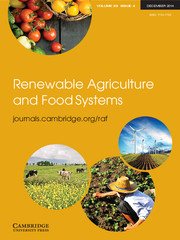Article contents
Can farmers' participation in contract farming promote the application of organic fertilizer? Empirical evidence from a sample of vegetable farmers in Shandong province of China
Published online by Cambridge University Press: 01 August 2022
Abstract
Determining an effective approach to replacing chemical fertilizer with organic fertilizer is a difficult challenge for the Chinese government. This paper constructs a dynamic analysis framework with broader application than previous statistical and case studies by theoretically deriving the impact of farmers' participation in contract farming on their organic fertilizer application behavior. The framework analyzes farmers' intertemporal organic fertilizer application behavior under the two scenarios of participation and nonparticipation in contract farming. Participation in contract farming positively impacts organic fertilizer application behavior in both the short and long terms. Survey data from 473 vegetable farmers in Shandong province of China were used to conduct an empirical analysis, and the endogenous switching probit model was used to solve the endogeneity problem of farmers' participation in contract farming. The empirical analysis supports the above results: farmers' participation in contract farming increases their probability of applying organic fertilizer by 50.7%. Robustness tests conducted using the recursive bivariate probit model and replacing the dependent variable (the intensity with which farmers replace chemical fertilizer with organic fertilizer) confirm the research results. Further heterogeneity analysis shows that farmers' participation in contract farming has a more obvious promoting effect on organic fertilizer application behavior in the older group, the group with an education level of primary school or below and the small-scale farming group. Therefore, the government should promote participation in contract farming, especially among elderly, low-education and small-scale farmers, to improve the adoption level of organic fertilizer in China.
Keywords
- Type
- Research Paper
- Information
- Copyright
- Copyright © The Author(s), 2022. Published by Cambridge University Press
References
- 7
- Cited by



